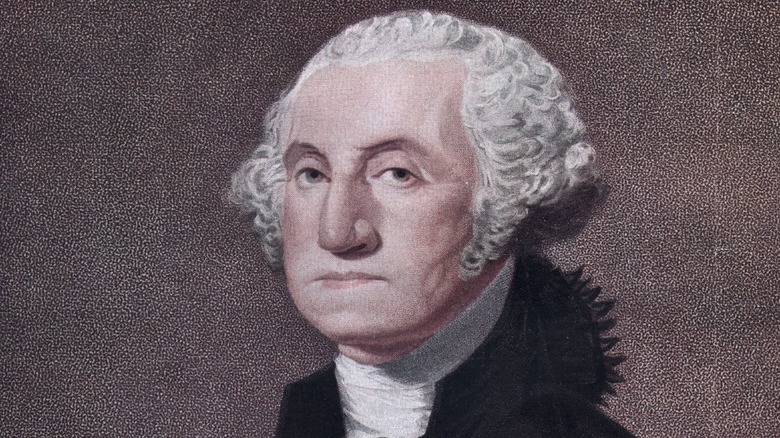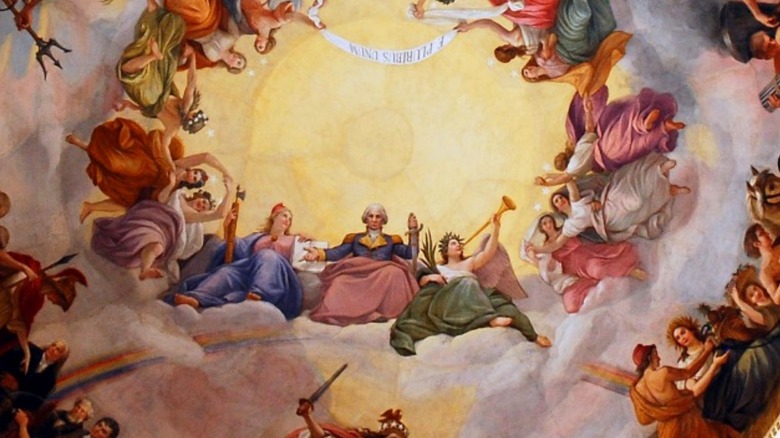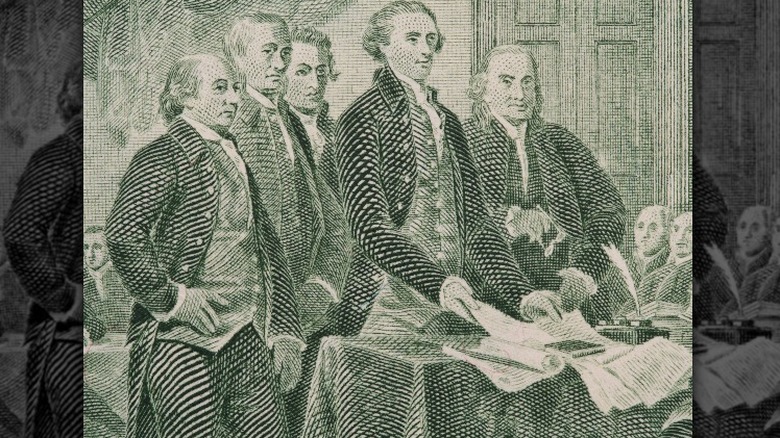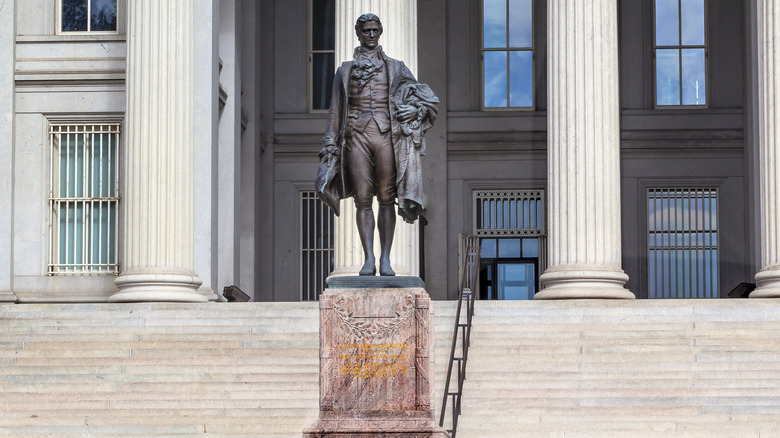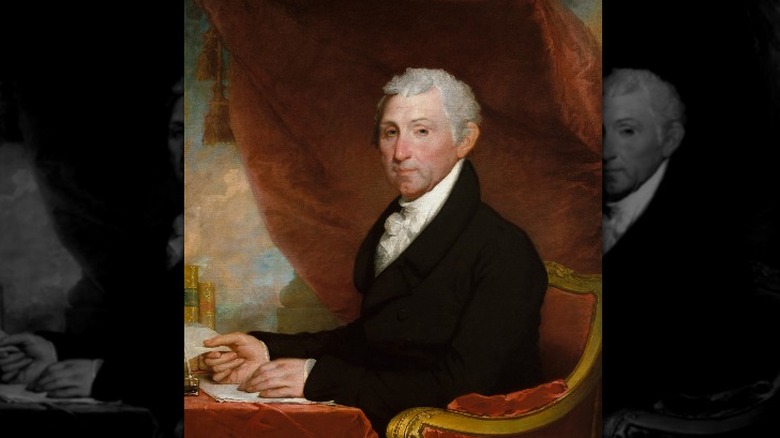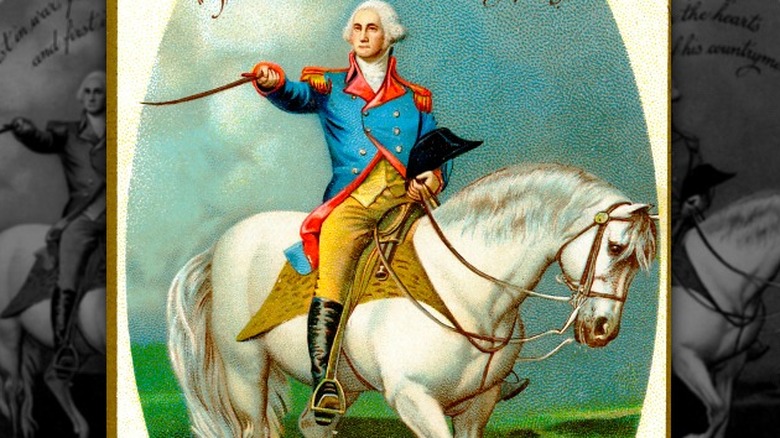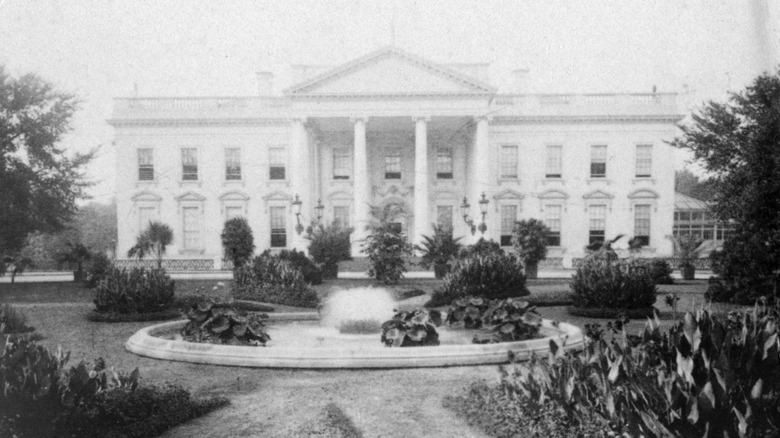US Presidents Who Ran Unopposed In Their Elections
The United States of America prides itself on its robust arena of political debate. It wasn't always that way. It's a relic of an era we'll almost certainly never see again, but in 1788-89 and in 1820, George Washington and James Monroe ran for election unopposed. Neither candidate was free from criticism and controversy, and both preceded new eras of tense partisanship and transformations in the system of American political parties more broadly.
If a person entirely unfamiliar with the United States was to read any popular corpus of its early history, they might reasonably get the impression that America does have a king. George Washington, who won the first two American elections unopposed, is so exalted in his legacy that praise for the Virginia slaveowner and demigod occasionally ventures into the realm of the absurd. In "The Greatness of George Washington," published in Virginia Quarterly Review, George Washington is credited with the creation of the American presidency, the origination of democratic rule itself, impeccable dancing skills, and a physique reportedly admired by "both men and women." As far as yet known, Washington's physique had little bearing on his winnings in the electoral college, the policies of his administration, or his role as a military general, but for some reason, it is well-documented in history.
The Apotheosis of George Washington: Unanimous Victories in 1788-89 & 1792
Not only did George Washington achieve unanimous victory in the first two American elections, but he seems to have won himself status quite literally everywhere in American life, from the dollar to the capital city to the article you're reading right now. Washington is plastered upon, appended to, and superimposed upon everything. Even hymns have been composed for George Washington (via Virginia Quarterly Review). If the U.S. Capitol attackers had averted their eyes heavenward while committing their crime, they would have seen Washington glowering down upon them with all the fury of an Old Testament prophet (via Architect of the Capitol). An 1865 fresco by Constantino Brumidi entitled "Apotheosis of Washington" portrays Washington upon a throne of clouds clutching what looks suspiciously like a scepter.
Frescos, hymns, and superior dancing skills don't win elections, but mythologizing aside, these examples illustrate the probability of an improbable situation, and Washington's election was a law unto itself — not, however, thanks to his attested greatness or superiority as a mortal man. Washington unified a conflicted people who would otherwise have had little cause to unify (via Miller Center). The Continental Congress knew this in 1775 when they appointed Washington (a Virginia slave-owner and military general) as commander-in-chief of the newly-formed Army (via Center for Digital History at Mount Vernon). (According to the Library of Congress, John Hancock was also a contender.)
Washington's Extraordinary Powers
According to the Library of Congress, during George Washington's tenure as commander-in-chief to the Army, he conducted himself like a leader of state even before he officially was one. While serving as commander-in-chief of the Army in 1775, he authored an address urging Canadians to support the war (a task which clearly fell outside the scope of a military general's duties, no matter how vaunted the general, per Library of Congress). In another example, Washington enthusiastically announced the signing of the Declaration of Independence to his troops once he received word, then led them in a military parade, read the document to his troops, then led them in a parade of celebration. As the war stretched on into December of 1776, the Continental Congress in Philadelphia granted George Washington — whose popularity was well-known by this time — special authorization to exercise extraordinary powers for the next six months (via Library of Congress). Before the presidency was even invented, George Washington was doing the job.
After the end of the war, the Continental Congress scarcely considered (or rather, did not at all consider) other candidates for the presidency (via Miller Center). According to election results, neither did the voters of the electoral college: Washington won in a unanimous vote.
The Birth of New Political Parties & the Resignation of George Washington
Contrary to legend, George Washington was anything but popular by the end of his second term. In a letter to his friend Henry Knox written shortly after the 1788-89 election, Washington compared the presidency to an execution chamber (via The Washington Post): "My movements to the chair of Government will be accompanied with feelings not unlike those of a culprit who is going to the place of his execution." By the time he retired from the public eye, he had altogether tired of political life.
According to the Center for Digital History at Mount Vernon, the 1792 election was the first truly partisan contest, with a face-off between vice-presidential candidates John Adams and George Clinton splitting the votes of the soon-to-be Federalist faction and the soon-to-be Jeffersonian-Republicans. Despite the cracks of political contention beginning to surface (notably around Alexander Hamilton's controversial National Bank), Washington easily won his second term — once again — unanimously (via Britannica), then finally retired from political life in 1796. George Washington's exit from political life ushered in an era of intense partisan conflict that would dominate American political life for the next several years — a trait he shared with U.S. president James Monroe, the next American president to run unopposed in an election.
James Monroe's 1820 Election & the Era of Good Feelings
While George Washington's exit from political life earmarked the birth of a new party system, James Monroe's election to the presidency witnessed its collapse. Monroe, a white Virginia slaveowner like Washington, was the second and final American president to run for election unopposed. Monroe was the last Democratic-Republican candidate and the very last Founding Father to occupy the presidency (via History Daily).
The last Federalist candidate to run was Rufus King in 1916, whom James Monroe overwhelmingly defeated (via 270 to Win). When the Federalist Party dissolved during Monroe's first term, former Federalists assembled into new coalitions that would set the stage for a high-stakes face-off between five contenders in 1824. By the time Monroe left office, an American two-party system had already formed, bringing the political interregnum to a swift and abrupt end.
James Monroe's 1820 Election & the Era of Indifference
The lack of viable opponents challenging James Monroe was due to the collapse of the Federalist Party, not Monroe's universal appeal — although he was well-liked (via History Is Now). Despite the 1819 financial crisis, a host of high-octane debates about slavery, and tensions with Spain (via History), Monroe's first term was known as the Era of Good Feelings (via 270 to Win, History Daily). Compared to the years preceding it and the years that would follow, the political conflict of the era was indeed relatively relaxed.
This doesn't mean Monroe's administration was hailed for its perfection: "[T]he unanimity, about which we hear so much," John Randolph reportedly remarked after Monroe's 1820 inauguration (via The Mississippi Valley Historical Review), "is the unanimity of indifference, and not of approbation." Monroe had few fervent proponents and few zealous enemies, a fitting ellipses to the final episode in the history of American elections where it might even be conceivable for a candidate to run unopposed.
The Apotheosis of James Monroe & the Enduring Nature of American Discourse
James Monroe's reelection in 1820 was so certain that he was never even officially nominated (via 270 to Win). Yet unlike George Washington, Monroe did not win reelection unanimously. One lone elector, William Plumer of New Hampshire, cast his vote against James Monroe, instead favoring John Quincy Adams, then-secretary of state. Although American legend somehow immortalized Plumer as the man who cast a single opposition vote so that only George Washington alone may have the legacy of a unanimous victory, in actuality, Plumer simply wasn't a fan of Monroe's administration (via The Mississippi Valley Historical Review).
The lack of an opposition candidate didn't indicate good feelings abounded on every political front. In an 1819 letter by William Plumer Jr. quoted by the Mississippi Valley Historical Review, criticism of Monroe's administration is alive and well: "Not a day passes, in which some abuse is not detected, and some attacks made upon the administration."
Now that sounds more like U.S. politics.
